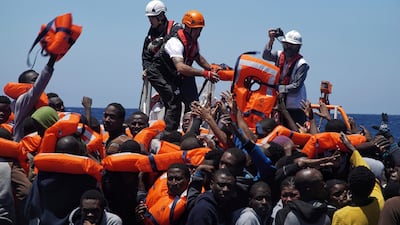Aid groups have suspended their migrant rescue operations in the Mediterranean days after Tripoli authorities announced a maritime exclusion zone off the Libyan coast.
German aid group Sea Eye suspended its operations on Sunday, a day after Medicines Sans Frontiers halted the use of their largest rescue boat in the area due to an "increasingly hostile environment for lifesaving rescue operations". Sea Eye said it was with "a heavy heart" that it had decided to follow suit after the Libyan government's "explicit threat against the private NGOs".
On Thursday, Libya’s UN-backed Government of National Accord announced an exclusion zone that would bar rescue boats from operating. The GNA did not say how wide the exclusion zone will be, but it is likely to extend beyond the present 20-kilometre territorial limit.
"We want to send out a clear message to all those who infringe Libyan sovereignty and lack respect for the coastguard and navy,” said its naval spokesman General Ayoub Qassemhe. From now on, he added, rescue boats must “obtain authorisation from the Libyan state even for rescue operations”.
MSF is one of eight non-governmental organisations that operate rescue boats just outside the 20km limit, rescuing migrants who leave the Libyan coast in flimsy craft and transporting them to Italy.
The humanitarian group said it was withdrawing its rescue ship Prudence after advice from Italian maritime authorities drawing attention to the Libyan declaration.
UPDATE: With NGOs more and more restricted in the Med & the #EU determined to trap people in #Libya, we've put the #Prudence on standby. pic.twitter.com/4stMq5QmHQ
— MSF Sea (@MSF_Sea) August 12, 2017
"MSF has decided to temporarily suspend the search and rescue activity of its ship, Prudence," the group said . But its doctors would continue to operate on the boat of another NGO, it said.
Libya’s imposition of the zone marks a new determination to halt people-smuggling, with the North African country the centre of the trafficking of migrants from Africa, the Middle East and Asia trying to reach Europe. More than 95,000 migrants have crossed from Libya to Italy this year, with 2,300 drowning in the attempt, after 165,000 crossed last year.
A Spanish NGO, Proactiva Open Arms, released video last week which it said showed a Libyan coastguard vessel firing warning shots near one of its rescue boats.
Some Libyan officials say migrant rescue boats act as a magnet for people-smugglers. Libya is facing growing numbers of migrants arriving to seek passage to Europe, and has drawn criticism in recent weeks from groups including the charity Oxfam who say there are human rights abuses in its migrant detention camps. Libyan officials are also concerned that migrant-smuggling has become a growing branch of organised crime in the country.
_________________________________________________
Read more:
EU’s Mediterranean migrant dilemma: Are aid groups providing a ferry service for human smugglers?
MSF doctor’s journey of a lifeline to help the world’s vulnerable
Migrant rescues off Libya ‘encourage traffickers’
_________________________________________________
The GNA’s concern is shared in Italy, where more than 600,000 migrants have arrived since 2014.
Earlier this month Italy deployed two warships to assist Libya’s coastguard in intercepting migrant smugglers, a deployment condemned by the GNA’s rival government, the House of Representatives. HOR army chief Field Marshal Khalifa Haftar has ordered air and naval units to confront any unauthorised foreign vessels in Libyan waters.
Italy has also begun investigating migrant-rescue groups to see if they coordinate with Libyan people-smugglers, an allegation the NGOs deny.
The chief prosecutor for the Sicilian port city of Catania, Carmelo Zuccaro, announced an investigation on April 25. "We don't know if and how to utilise this information in the judicial process, but we're certain enough of what we're saying: [there are] telephone calls from Libya to some NGOs," Mr Zuccaro told Italian newspaper La Stampa.
Then on August 2, Italian officials in Lampedusa seized a ship, the Iuventa, operated by Berlin-based NGO Jugend Rettet, and began investigation into whether it was colluding with Libyan people-smugglers.
Jugend Rettet denies it cooperates with people-smugglers.
In a Facebook post, Jugend Rettet called for a suitable independent organisation to mediate between NGOs and Italy on a code of conduct that did not leave migrant lives in danger. “We wish to establish a code of conduct that is built on governing law and mutual trust. If we all work together, we will find a solution,” it said.
Italy wants the NGOs to sign its own code of conduct, published in late July, allowing Italian authorities to monitor NGO finances and missions. Four NGOs have signed the code while four others, including MSF and Jugend Rettet, have not. Officials in Rome say NGOs not signing its code of conduct may be barred from Italian ports.
Cooperation between Rome and Tripoli on migration was endorsed as “very constructive” by the UN’s new Libya envoy, Ghassan Salame. "It would be absolutely unrealistic to ignore the seriousness of the challenge of irregular migration,” Mr Salame said in August.
The tougher line on migrants may already be reducing the number of migrants making the dangerous journey across the sea. In July, 11,459 migrants crossed from Libya to Italy, less than half the 23,524 who made the journey in June.
However, MSF warned that without rescue boats, many more migrants may die at sea. “If humanitarian ships are pushed out of the Mediterranean, there will be fewer ships in the area to rescue people from drowning,” warned Annemarie Loof, MSF’s operational manager.
* additional reporting from Agence France-Presse
